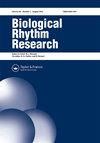The effect of chronotype on chrononutrition and circadian parameters in adults: a cross-sectional study
IF 0.9
4区 生物学
Q3 BIOLOGY
引用次数: 0
Abstract
ABSTRACTThis study aims to assess the chrononutrition behaviors, circadian parameters, and meal distribution of the dietary intake according to the chronotypes. This study included 362 adults (51.1% females and 48.9% males). 24-hour dietary recalls were performed separately for weekdays and weekends. Chrono nutritional behaviours, the Night Eating Questionnaire, Pittsburg’s Sleep Quality Index and the Morningness-Eveningness Questionnaire were performed. Morning individuals were found to have more regular meals, had a higher total number of meals and frequency of breakfast, while they had lower NES scores and eating jetlag than evening individuals. Breakfast energy intake was greater in the morning group on weekdays and weekends, whereas dinner energy intake was higher in the evening group only on weekdays.The evening chronotype has been reported to have more unhealthy eating habits and to be prone to having more energy intake in later hours. Further study is needed to recommed dietary treatment based on chronotype and chrononutrition for optimal health.KEYWORDS: Chrononutritionchronotypecircadian parametersdietary intakebreakfast AcknowledgmentsThe authors are grateful to all the individuals who contributed their time to this study. We appreciate their helpful and sincere cooperation as well as their enthusiastic support for the work.Disclosure statementNo potential conflict of interest was reported by the author(s).Credit authorship contribution statementGizem Özata-Uyar: Investigation, Data curation, Methodology, Formal Analysis, Writing – Original Draft, Writing- review & editingHilal Yıldıran: Supervision, Writing- review & editingGülay Korkmaz: Investigation, Data curation, MethodologyGülnur Kılıç: Investigation, Data curation, MethodologyBehiye Nur Korkmaz: Investigation, Data curation, MethodologyAdditional informationFundingThis research did not receive any specific grant from funding agencies in the public, commercial, or not-for-profit sectors.时间型对成人时间营养和昼夜节律参数的影响:一项横断面研究
摘要本研究旨在探讨不同时型动物的时间营养行为、昼夜节律参数及膳食摄入的膳食分布。本研究包括362名成年人(51.1%为女性,48.9%为男性)。在工作日和周末分别进行24小时饮食回顾。进行时间营养行为、夜间进食问卷、匹兹堡睡眠质量指数和早晚性问卷调查。研究发现,早起的人吃饭更规律,总吃饭次数和早餐频率更高,而他们的NES得分和饮食时差都低于晚睡的人。在工作日和周末,早晨组的早餐能量摄入量更高,而晚上组的晚餐能量摄入量仅在工作日更高。据报道,晚睡型的人有更多不健康的饮食习惯,并且在晚些时候容易摄入更多的能量。需要进一步的研究来推荐基于时间类型和时间营养的最佳健康饮食治疗。关键词:时间营养、生物钟参数、饮食摄入、早餐感谢作者感谢所有为本研究贡献时间的个人。我们感谢他们的帮助和真诚的合作以及他们对工作的热情支持。披露声明作者未报告潜在的利益冲突。gizem Özata-Uyar:调查、数据策展、方法论、形式分析、写作-原稿、写作-审查与编辑hilal Yıldıran:监督、写作-审查与编辑 lay Korkmaz:调查、数据策展、方法论 lnur Kılıç:调查、数据策展、方法论behiye Nur Korkmaz:调查、数据管理、方法附加信息本研究未获得公共、商业或非营利部门资助机构的任何特定资助。
本文章由计算机程序翻译,如有差异,请以英文原文为准。
求助全文
约1分钟内获得全文
求助全文
来源期刊

Biological Rhythm Research
生物-生理学
CiteScore
3.00
自引率
9.10%
发文量
34
审稿时长
6-12 weeks
期刊介绍:
The principal aim of Biological Rhythm Research is to cover any aspect of research into the broad topic of biological rhythms. The area covered can range from studies at the genetic or molecular level to those of behavioural or clinical topics. It can also include ultradian, circadian, infradian or annual rhythms. In this way, the Editorial Board tries to stimulate interdisciplinary rhythm research. Such an aim reflects not only the similarity of the methods used in different fields of chronobiology, but also the fact that many influences that exert controlling or masking effects are common. Amongst the controlling factors, attention is paid to the effects of climate change on living organisms. So, papers dealing with biometeorological aspects can also be submitted.
The Journal publishes original scientific research papers, review papers, short notes on research in progress, book reviews and summaries of activities, symposia and congresses of national and international organizations dealing with rhythmic phenomena.
 求助内容:
求助内容: 应助结果提醒方式:
应助结果提醒方式:


